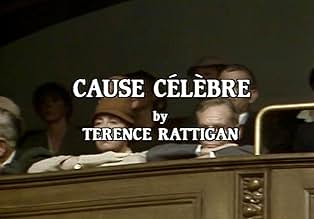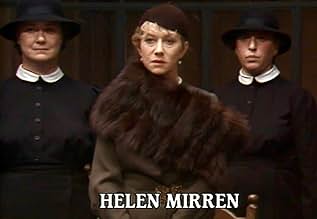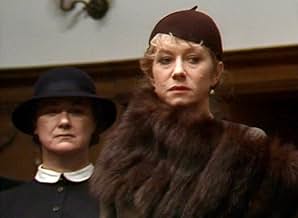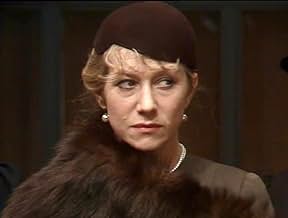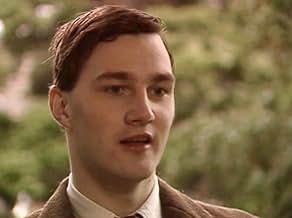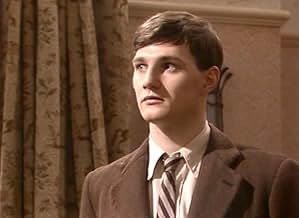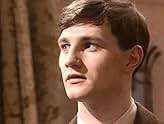When a woman's husband is murdered by her lover, both are tried for murder. The prosecution claims that she is the mastermind behind the crime, but she has an ace up her sleeve.When a woman's husband is murdered by her lover, both are tried for murder. The prosecution claims that she is the mastermind behind the crime, but she has an ace up her sleeve.When a woman's husband is murdered by her lover, both are tried for murder. The prosecution claims that she is the mastermind behind the crime, but she has an ace up her sleeve.
- Director
- Writers
- All cast & crew
- Production, box office & more at IMDbPro
Featured reviews
Alma and Stoner were both arrested and put on trial for the killing. The problem facing Alma's defence team was not her false confession, which she later withdrew and which the police had never taken seriously, but the widespread public hostility to their client. Public opinion, encouraged by hysterical reporting in the national press, was firmly of the view that she had encouraged and incited Stoner to carry out the crime. This narrative was eagerly adopted by Stoner's defence team, who believed that their only hope of saving him from the gallows was to paint him as the victim of an evil older seductress. (At the time of the killing, Rattenbury was 67, Alma in her late thirties and Stoner 18, young enough to be given the death penalty under the law as it then stood).
These events were later dramatised by Terence Rattigan in his stage play "Cause Celebre", which formed the basis for this film, made by Anglia Television, part of the ITV network. (Rattigan had earlier written another play based on a real-life court case, "The Winslow Boy", which was also filmed), It follows the events of the Rattenbury case fairly closely, although Alma's young lover is here renamed "George Bowman"; the real George Stoner was still alive in 1987. Scenes showing the progress of the affair between Alma and George and the killing of Rattenbury are intercut with scenes showing events in the courtroom.
There are two particularly fine performances from Helen Mirren as Alma, trapped in a passionless marriage to a much older man, and from Harry Andrews as Francis, grumpy and irascible but not altogether unsympathetic. Andrews would have been 76 in 1987, nearly a decade older than the real Francis Rattenbury. (This was his last film before his death in 1989). David Morrissey plays George as the sort of rather gauche and charmless young man who has never had a girlfriend of his own age, who feels an intense passion for an attractive older woman but who is unable to cope when, unexpectedly, he finds that his feelings are returned. One thing that, because of his youth and inexperience, he is unable to understand is that sexual attraction and affection are not the same thing. Francis and Alma's marriage may be passionless but it is not necessarily loveless. Alma loves her elderly husband as a sort of father-figure, but George mistakes her affection for him as evidence of a continuing sexual relationship, provoking his fatal fit of jealousy. Another good performance comes from David Suchet as Alma's defence lawyer Terence O'Connor, a humane man trying his best to save his client from the gallows even though she seems indifferent as to whether she lives or dies.
Had this been made as a feature film, it would probably be celebrated today as part of the great revival of the British cinema in the eighties, along with the likes of "Chariots of Fire", "Gandhi", "The Mission" and "Shirley Valentine". TV movies, however, tend to fall back into obscurity after they have been shown once, with a possible repeat a few years later, and so it has proved with "Cause Celebre". The film is today little known, although it does occasionally turn up on television, largely on the specialist movie channel "Talking Pictures" (which deserves credit for trying to keep alive films neglected by the major networks). And this is a film which deserves to be better known, both as an acute psychological study of a love-triangle and as a gripping courtroom thriller. 8/10.
If my expectations had been different, I might have enjoyed this movie more. The set design was superb, as was most of the acting and the dialog (although, without subtitles, the British accent was a bit difficult for me to understand at times).
On the other hand, I might have been disappointed anyway, since the story is somewhat disjointed and I never bought into the relationships between the characters (the two mismatched lovers, the husband and wife, the wife and 'companion' etc.) The story might have been true, but that doesn't necessarily make it a good movie.
Inspired by the true life murder of architect Francis Rattenbury in 1935. This was an adaptation of the play written by Terence Rattigan. It is not a television movie as it was shot on video. More a feature length drama.
As one of the main characters was still alive in 1987, some of the names have been fictionalised.
David Morrissey plays George Bowman. An immature, angry 18 year old man who is employed as a chauffeur for the Rattenbury's. He becomes obsessed with crooner Alma Rattenbury (Mirren) who is in her 30s but married to the much older Francis Rattenbury (Harry Andrews) who she met in Canada.
Both George and Alma embark on a torrid affair. George getting increasingly jealous of Alma's husband. When Francis is found bludgeoned to death, both stand trial for murder.
Told in flashbacks, this is a dreary drama. There was no vigour in it and neither was it salacious enough. There is a good cast here but they are wasted. To me it did not work as a mystery or a courtroom thriller.
Did you know
- TriviaThe story is based on the true story of the murder of Francis Rattenbury, and is faithful to the facts. However George's surname had to be changed as the real person (George Percy Stoner) was alive when the play was written and when the television adaptation was produced.
- GoofsWhen Helen Mirren takes the train ride at the end of the film, the train is composed of British Railways compartment stock built in the late 1950s. More than 20 years too modern for the supposed date.
- Quotes
Francis Rattenbury: Why the hell I ever let you drag me down to this god-forsaken hole, I don't know.
Alma Rattenbury: You know why, darling - we wanted the fresh air...
Francis Rattenbury: And that's just about all we're going to have to live on.
- ConnectionsReferences Les Trois Lanciers du Bengale (1935)
Details
- Release date
- Country of origin
- Language
- Also known as
- Mord aus Leidenschaft
- Production company
- See more company credits at IMDbPro

